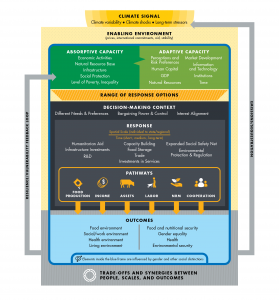As both the current and future impacts of climate change are coming into focus, policymakers, communities, households, and individuals around the world are taking steps to prepare for and respond to these challenges proactively. While greater awareness now exists of the types of challenges climate change engenders, many decisionmakers still lack context-specific information on climate and the best approaches to address climate-related challenges without sacrificing other development goals. Agriculture is at once the sector most vulnerable to the negative impacts of climate change, while also being a significant contributor of greenhouse gas (GHG) emissions. Strengthening the climate change resilience of agriculture and agricultural livelihoods is imperative to ensure that other key development outcomes related to reducing poverty and improving food and nutrition security are achieved, and that the potential for conflict and displacement are minimized.
The Gender, Climate Change, and Nutrition Integration Initiative (GCAN) is a program of the International Food Policy Research Institute (IFPRI), supported by the United States Agency for International Development (USAID). GCAN aims (1) to support USAID missions and implementing partners in efforts to integrate climate science, gender, and nutrition into their agricultural programming activities to enhance the resilience of program outcomes; (2) to build the evidence base on the interlinkages between these key cross-cutting topics; and (3) to provide conceptual guidance, tools, and forums for further analysis of the linkages among climate resilience, gender, and nutrition.

